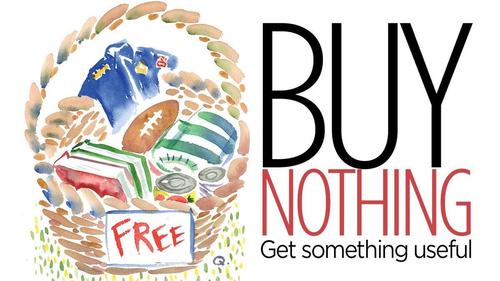The Emerging Alt-Economy: “Buy Nothing”
Authored by John Rubino via DollarCollapse.com,
Most of us own too much unnecessary stuff and have borrowed waaayyy too much money to buy said stuff. Meanwhile, all that debt is boosting inflation, making things that actually matter harder to afford.
But free people have a way of self-organizing solutions to their problems, and one of the more inspiring examples is the ‘Buy Nothing Project,’ through which members give or lend unneeded things to their neighbors. Think Craigslist without the asking prices.
Around two million Americans have joined related groups on FaceBook and elsewhere in the past year, bringing total participation to nearly five million.
In the best tradition of market-based fixes, “Buy Nothing” looks like a win for all concerned. Givers get the satisfaction of meeting and helping their neighbors while freeing up space occupied by things they no longer use. They also get to bank favors should help be needed in the future. Receivers, of course, get needed items for free. And the stuff itself gets a home where it’s used and valued. Any Toy Story fan knows this means a lot. The result: positive Karma all around.
From a recent Fortune article:
The collective cleaning out of closets that took place while people quarantined and socially isolated has fueled the Buy Nothing movement, as has the economic uncertainty the pandemic wrought. But experts say there’s also something deeper within our collective psyche that shifted in the past year and a half as people sat at home and realigned their priorities. “There’s a growing dis-ease with consumer culture and the way it operates,” says Juliet Schor, an economist and Boston College sociology professor who studies consumption. “The wastefulness, the cycle of acquisition and discard, is increasingly unappealing to people.” She calls this a “mainstreaming change” in how people think about consumerism.
Rebecca Rockefeller, cofounder of the Buy Nothing Project, says the gift economy has been around forever for a reason. “This is how we originally survived as a species,” she says. “It makes sense that it’s something that we are rediscovering the value of now, because we’re at one of those inflection points in society where we have a lot of thinking to do about how we’re going to move forward if we’re all going to make it.”
Alternatives to mainstream consumption have cycled through our culture for decades—voluntary simplifiers, downshifters, minimalists, simplicity circles. But the Buy Nothing Project is a kinder, less extreme version by design. Participating doesn’t force anyone to shift their relationship with capitalism or material possessions all that much, which helps explain why it has spread beyond the hard-core early adopters. “You could say this is consumption with conscience, with sustainability in mind, but it is absolutely consumption. We’re just sharing the resources,” says Liesl Clark, Rockefeller’s Buy Nothing Project cofounder. “It’s not a movement of austerity.”
So we can add Buy Nothing to the growing list of positive responses to the globalist/consumerist/inflationist takeover. Other things on the list include the gardening/homesteading renaissance, facilitated by sites like Grow Network that help non-gardeners become food self-sufficient, and Peak Prosperity, which teaches skills for personal resilience. And of course the financial trend away from fiat currency and towards real money like gold, silver and bitcoin.
These subcultures are still tiny compared Wall Street banks and big-box stores. But they’re growing and coalescing into what looks like a coherent alternative economy that’s vastly healthier than the current one.
Tyler Durden
Mon, 11/22/2021 – 12:35
via ZeroHedge News https://ift.tt/3cHsfPC Tyler Durden
